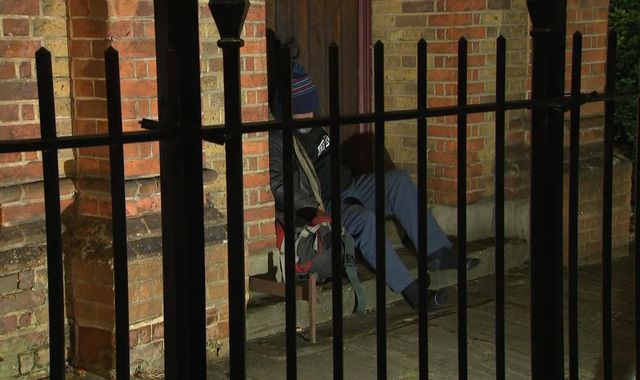Coronavirus: How do you self-isolate if you are homeless?
Written by News on 16/03/2020
Who cares about a virus when you are starving hungry? Not Daniel. He believes rough sleeping has built up his immunity.


In his mid-20s and on crutches, he was waiting for a pop-up soup kitchen in Charing Cross in central London, and did not seem too bothered about the coronavirus outbreak.
He told Sky News: “If you are forced to eat little bits of leftovers of everything on the street – flowers, and everything else, drink a little bit from every glass or bottle that people have left behind – you are building the amount of substances you have inside you.
“So, if you are a rough sleeper you have the flu shot – the vaccination for it.”
Daniel might feel immune, but charities say his exposure to germs makes him more vulnerable.
Members of the Sikh Action Welfare Team (SWAT), who brought food to the Charing Cross kitchen, said they are struggling with a lack of clear government advice on how to protect this group from COVID-19.
Another obvious concern is how to self-isolate if you do not have a home.
Tarun Singh Nagpal, a member of SWAT, said: “The guidance we’ve given after discussing it with local hospitals, on isolation, it’s about maintaining an adequate distance from their peers around them, not sharing tents with an infected person.
“The difficulty comes in trying to direct them to the appropriate services. Some of these people don’t have phones and we’re telling them to call NHS direct on 111.”
Gary Saxton, 67, who was also using the soup kitchen said: “One of the day centres I use – when you go in, they squirt your hands with sanitiser. As they rightly point out, you may have been on a bus.
“But what if it gets into a hostel. It would have to be closed down. And perhaps nobody would be allowed to leave.”
Indeed, this is a question hostels like Glass House are asking themselves. At their centre in Battersea all the men sleep in one room, all the women in another.
Lucy Abraham from Glass House told Sky News: “In terms of isolation it’s really unclear what that looks like if you normally sleep on the streets.
“We are an open access service, so we don’t turn anybody away. It’s part of our ethos.
“Now having to turn people away, it feels inhumane, but also, it’s a big public health risk because where are they going to go?”
The government released guidance on Monday for hostels like Glass House saying that they do not need to close unless directed to do so by Public Health England or the government.
The guidance also says: “If a resident in a hostel becomes unwell, they should stay in their room.
“If someone becomes unwell in a day centre, and they do not have a home or room in which to self-isolate, they should be isolated temporarily in an area of the day centre and staff are advised to contact the local authority.”
Charities say this does not go far enough.
Caroline Bernard, head of policy and communications at Homeless Link said: “Section 189 of the Housing Act sets out that in an emergency situation such as a flood or a disaster, people who are homeless can be housed – and we think this is one of those situations where there is a clear emergency – people need to be brought in off the streets quickly.”
Homeless Link also recommends that local areas establish a homelessness and COVID-19 task force, including the police, housing, health, homelessness, people with lived experience and the wider voluntary sector.
There are 10,000 rough sleepers in the UK and 320,000 homeless people using hostels, friend’s sofas or temporary houses.
Louise Cassy, appointed to lead a review into rough sleeping by Boris Johnson last month, said she was “worried” COVID-19 would result in more hunger and homelessness in Britain.
She has urged the government to explore “rental holidays” for those in insecure employment across the country affected by the spread of the virus.
:: Listen to the Daily podcast on Apple Podcasts, Google Podcasts, Spotify, Spreaker
Steven, who is using the London soup kitchen, is exactly the type of person she is referring to.
Twenty years old, he lost his job and unable to pay his rent, ended up on the streets.
But, like Daniel, he is more worried about food and shelter than a virus.
He said: “There are more daily concerns when you are on the street, and other dangers.
“But if it becomes an epidemic where it’s killing people left right and centre then I’ll start worrying about it more.
“I try to keep basic hygiene and wash my hands before I eat. But I’ve done that all my life.
“People have offered me hand gels and stuff – but I think if this is a global disease, it’s going to take more than a hand gel to stop it.”
For most people, currently queuing for food in supermarkets rather than soup kitchens, the basic government guidance for COVID-19 is clear – but it does assume people have regular access to soap and water, the use of a phone and a roof over their head.
Homeless people, many who have underlying health conditions and poor sanitation, are once again bottom of the chain.
(c) Sky News 2020: Coronavirus: How do you self-isolate if you are homeless?






